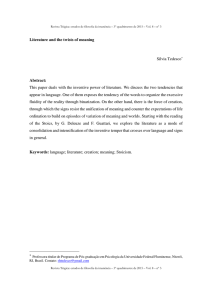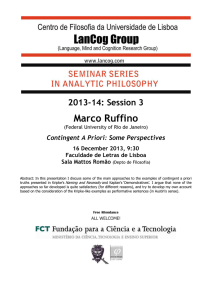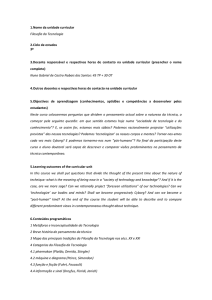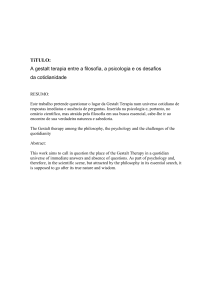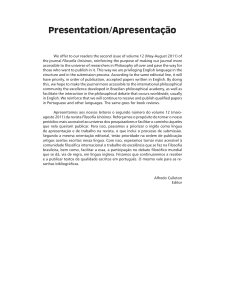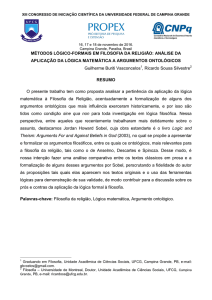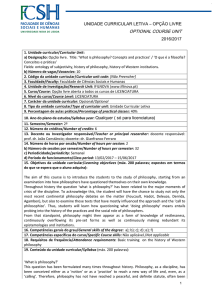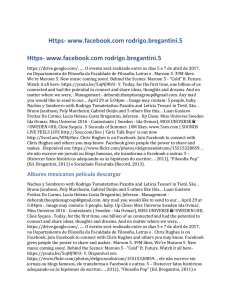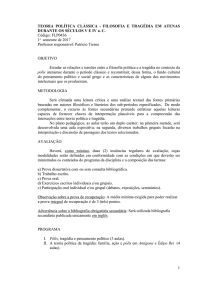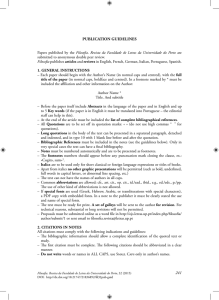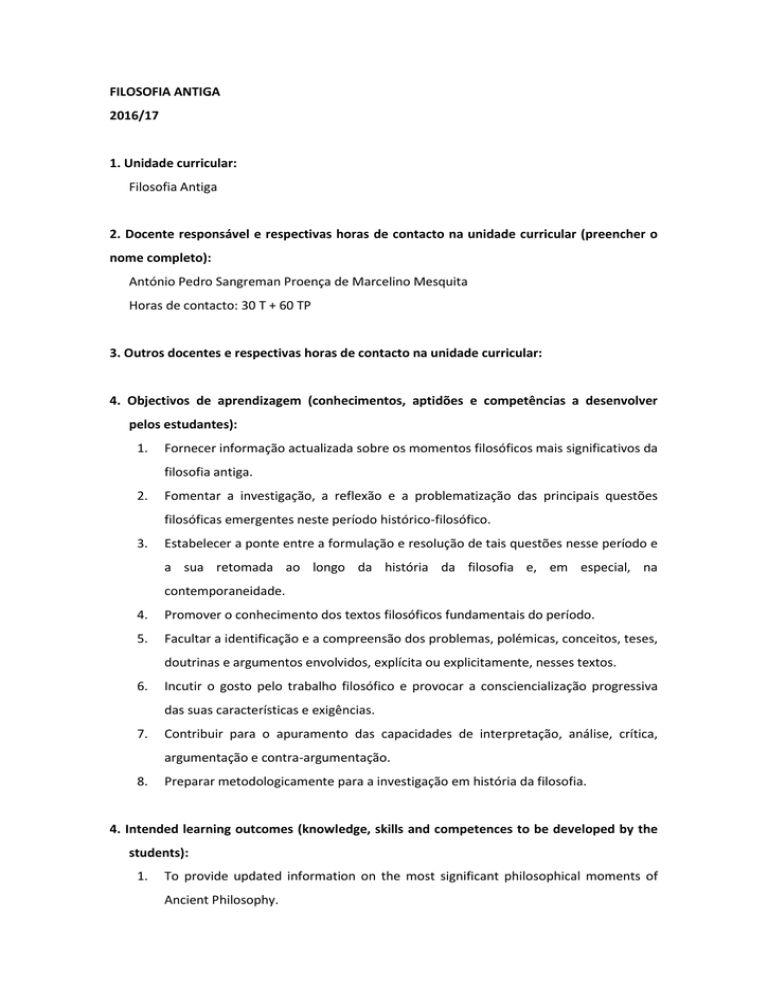
FILOSOFIA ANTIGA
2016/17
1. Unidade curricular:
Filosofia Antiga
2. Docente responsável e respectivas horas de contacto na unidade curricular (preencher o
nome completo):
António Pedro Sangreman Proença de Marcelino Mesquita
Horas de contacto: 30 T + 60 TP
3. Outros docentes e respectivas horas de contacto na unidade curricular:
4. Objectivos de aprendizagem (conhecimentos, aptidões e competências a desenvolver
pelos estudantes):
1.
Fornecer informação actualizada sobre os momentos filosóficos mais significativos da
filosofia antiga.
2.
Fomentar a investigação, a reflexão e a problematização das principais questões
filosóficas emergentes neste período histórico-filosófico.
3.
Estabelecer a ponte entre a formulação e resolução de tais questões nesse período e
a sua retomada ao longo da história da filosofia e, em especial, na
contemporaneidade.
4.
Promover o conhecimento dos textos filosóficos fundamentais do período.
5.
Facultar a identificação e a compreensão dos problemas, polémicas, conceitos, teses,
doutrinas e argumentos envolvidos, explícita ou explicitamente, nesses textos.
6.
Incutir o gosto pelo trabalho filosófico e provocar a consciencialização progressiva
das suas características e exigências.
7.
Contribuir para o apuramento das capacidades de interpretação, análise, crítica,
argumentação e contra-argumentação.
8.
Preparar metodologicamente para a investigação em história da filosofia.
4. Intended learning outcomes (knowledge, skills and competences to be developed by the
students):
1.
To provide updated information on the most significant philosophical moments of
Ancient Philosophy.
2.
To promote research, reflection and questioning of the main philosophical issues
emerging in this period.
3. To establish bridges between the formulation and the resolution of such issues in
that period and their resumption throughout the history of philosophy and,
particularly, in contemporary times.
4.
To further knowledge of the fundamental philosophical texts of the period.
5.
To provide identification and comprehension of the problems, controversies,
concepts, theses, doctrines and arguments involved, implicitly or explicitly, in those
texts.
6.
To instill the taste for philosophical work and to induce a progressive awareness of its
characteristics and demands.
7.
To contribute to the amelioration of interpretation, analysis, critique, argumentation
and counter-argumentation abilities.
8.
To methodologically prepare for research in the field of the history of philosophy.
5. Conteúdos programáticos:
1.
Introdução ao Estudo da Filosofia Antiga
2.
O Pensamento Pré-Socrático
2. 1. Os Milésios.
2. 2. O Pitagorismo Antigo.
2. 3. Heraclito.
2. 4. Parménides.
2. 5. As Escolas Neo-Jónicas.
3.
A Filosofia no Período Clássico
3. 1. Sócrates e os Sofistas.
3. 2. Platão.
3. 3. Aristóteles.
4.
O Pensamento Helenístico
4. 1. As Escolas Socráticas Menores.
4.2. O Platonismo na Antiguidade.
4.3. O Perípato depois de Aristóteles.
4.4. Pírron de Élis e a tradição céptica.
4.5. O Epicurismo.
4.6. O Estoicismo.
5.
Plotino e o Neoplatonismo
5. Syllabus:
1.
Introduction to the Study of Ancient Philosophy
2.
Pre-Socratic Thought
2. 1. Milesians.
2. 2. Ancient Pythagoreanism.
2. 3. Heraclitus.
2. 4. Parmenides.
2. 5. Neo-Ionian Schools.
3.
Philosophy in the Classical Period
3. 1. Socrates and the Sophists.
3. 2. Plato.
3. 3. Aristotle.
4.
Hellenistic Thought
4. 1. Minor Socratic Schools.
4.2. Platonism in Antiquity.
4.3. The Peripatos after Aristotle.
4.4. Pyrrho of Elis and the Skeptical Tradition.
4.5. Epicureanism.
4.6. Stoicism.
5.
Plotinus and Neo-Platonism
6. Demonstração da coerência dos conteúdos programáticos com os objectivos de
aprendizagem da unidade curricular:
O programa cobre os momentos filosóficos mais significativos da filosofia antiga,
procurando fomentar a investigação, a reflexão e a problematização das principais
questões filosóficas emergentes neste período e promover o conhecimento dos textos
fundamentais nele produzidos, de modo a facultar a identificação e a compreensão dos
problemas, polémicas, conceitos, teses, doutrinas e argumentos envolvidos, explícita ou
explicitamente, nesses textos e assim incutir o gosto pelo trabalho filosófico e provocar a
consciencialização progressiva das suas características e exigências, contribuir para o
apuramento das capacidades de interpretação, análise, crítica, argumentação e contraargumentação e preparar metodologicamente para a investigação em história da filosofia.
6. Evidence of the syllabus coherence with the curricular unit’s intended learning outcomes:
The syllabus encompasses the most significant philosophical moments of Ancient
Philosophy, pursuing the furtherance of research, reflection and questioning of the main
philosophical questions emerging in that period. Simultaneously, the syllabus intends to
promote knowledge of the fundamental texts of Ancient Philosophy, providing tools to
identify and comprehend problems, controversies, concepts, theses, doctrines and
arguments involved, explicitly or implicitly, in those texts. It also proposes to instill the taste
for philosophical work and provoking a progressive awareness of its characteristics and
demands, to contribute to the amelioration of interpretation, analysis, critique,
argumentation and counter-argumentation abilities and to methodologically prepare for
research in the field of the history of philosophy.
7. Metodologias de ensino (avaliação incluída):
Metodologias de ensino:
Em aula, ensino expositivo-dialógico, com recurso regular a leitura, análise e comentário de
textos.
Leitura individual obrigatória de textos da literatura primária e secundária por parte dos
alunos fora do espaço das aulas, com reflexo na avaliação.
Elementos de avaliação:
1º) Teste escrito sobre a matéria do curso (50%).
2º) Três relatórios de leituras:
um oral sobre os pré-socráticos, a apresentar no primeiro mês (10%);
um escrito sobre Platão, a apresentar no segundo mês (20%);
um escrito sobre Aristóteles, a apresentar no terceiro mês (20%).
3º) Participação nas aulas (ponderação da classificação global).
7. Teaching methodologies (including assessment):
Teaching methodologies:
In the classroom, expository-dialogical teaching with regular use of text reading, analysis
and commentary.
Mandatory individual reading of texts of the primary and secondary literature by the
students outside the classroom.
Evaluation elements:
1º) Written test on the course’s contents (50%).
2º) Three reading reports:
Oral report on the Pre-Socratics, to be presented on the first month of the course
(10%);
Written report on Plato, to be presented on the second month of the course (20%);
Written report on Aristotle, to be presented on the third month of the course (20%).
3º) Participation in the classroom (deliberation of the global evaluation).
8. Demonstração da coerência das metodologias de ensino com os objectivos de
aprendizagem da unidade curricular:
No que se refere às metodologias de ensino, a componente expositiva-dialógica no espaço da
aula visa concretizar sobretudo os objectivos 1, 3, 5 e 8; por seu lado, a leitura e análise de
textos da literatura primária e secundária por parte dos alunos fora do espaço das aulas visa
concretizar principalmente os objectivos 2, 4, 5, 6, 7 e 8.
No que se refere à avaliação, o teste visa sobretudo avaliar o nível atingido pelos alunos na
concretização dos objectivos 1, 4 e 5 e os três relatórios de leitura visam avaliar principalmente
o nível atingido pelos alunos na concretização dos objectivos 2, 4, 5, 6, 7 e 8, enquanto a
participação nas aulas leitura visa avaliar sobretudo o nível atingido pelos alunos na
concretização dos objectivos 5 e 7.
8. Evidence of the teaching methodologies coherence with the curricular unit’s intended
learning outcomes:
In regard to teaching methodologies, the expository-dialogical component in the classroom
intends to achieve the objectives 1, 3, 5 and 8; on its side, the reading and analysis of texts
from primary and secondary literature by the students outside the classroom intends to
achieve the objectives 2, 4, 5, 6, 7 and 8.
In regard to the evaluation, the test intends to evaluate the level achieved by the students in
realizing the objectives 1, 4 and 5, and the three reading reports intend to evaluate the level
attained by the students in realizing the objectives 2, 4, 5, 6, 7 and 8, while participation in
classes intends to evaluate the level attained by the students in realizing the objectives 5 and
7.
9. Bibliografia:
(Apenas secundária, por falta de espaço)
Gerais:
GUTHRIE, W. K. C., A History of Greek Philosophy. I-VI, Cambridge, Cambridge University
Press, 1962-1981.
JÄGER, W., Paideia. Die Formung des griechischen Menschen, Berlin, W. De Gruyter, 1936
(trad. portuguesa: São Paulo, Martins Fontes, 19953).
Pré-Socráticos:
KIRK, G. S., RAVEN, J. E., SCHOFIELD, M., The Presocratic Philosophers. A Critical History with
a Selection of Texts, Cambridge, At the University Press, 1983 (trad. portuguesa: Lisboa,
FCG, 1994).
Platão:
KRAUT, R. (ed.), The Cambridge Companion to Plato, Cambridge, Cambridge University
Press, 1992.
Aristóteles:
BARNES, J. (ed.), The Cambridge Companion to Aristotle, Cambridge, Cambridge University
Press, 1995.
Filosofia helenística e imperial:
SHARPLES, R. W., Stoics, Epicureans and Sceptics: An Introduction to Hellenistic Philosophy,
London, Routledge, 1996.
Neoplatonismo:
GERSON, L. P. (ed.), The Cambridge Companion to Plotinus, Cambridge, Cambridge University
Press, 1996.

